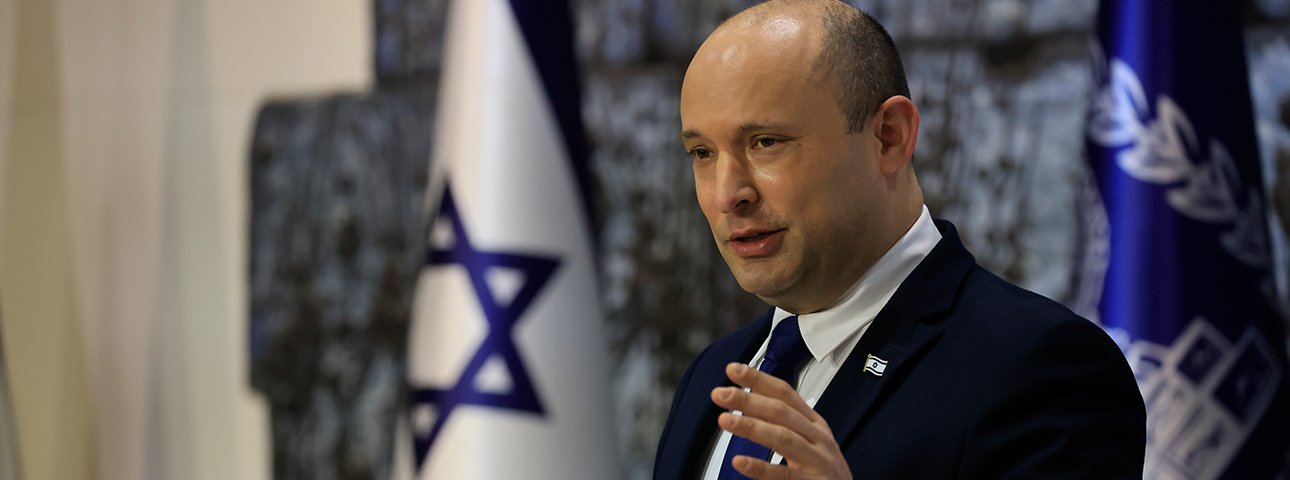Days of Judgement Ahead for the New Government
Let us wish the people of Israel, the government of Israel, and its leaders a Shana Tova, a good new year, and one in which we are able to meet the coming challenges and tests with success.

Prime Minister Naftali Bennett | Flash 90
The period between Rosh Hashana and Yom Kippur is known in Jewish tradition as the Ten Days of Repentance, during which we contemplate our actions over the last year so as to do better in the year ahead. The Bennett-Lapid government was sworn in less than three months ago, and thus, looking back, its main accomplishment to date is the very fact that it was formed. In the coming weeks, the state budget is due to be passed by the Knesset (for the first time since 2018) and the government will continue to make appointments to a slew of senior positions in the public sector which have remained vacant in recent months and years. From this perspective, one of the government’s main achievements has been to restore stability and to reduce the levels of incitement and hatred in public discourse.
However, looking a year into the future, simply ending Israel’s political crisis will not be good enough. Passing the budget will also mark the beginning of the real tests facing the new government, as it will have to provide responses to the country’s many urgent challenges and needs. The extent to which it succeeds in this task will be subject to review during the Ten Days of Repentance in a year’s time.
When it comes to Israel's security, the Bennett-Lapid government will be assessed in terms of how it handles the growing threat from Iran. Under its new leadership, Iran is continuing to advance toward military nuclear capability and is furthering its ambitions for regional hegemony. The Israeli government will need to develop a new strategy and to garner support for its implementation from the Biden administration, which has made clear its lack of interest in military engagement in the Middle East. In addition, Israel will have to ensure that the 'Abraham Accords' are bolstered with significant strategic and economic content, so that Iran and its allies are met with a strong and determined front led by Israel, the United States, and the more moderate Gulf states.
Regarding the economy, there is no room to rest on the laurels of having passed a state budget. The continued skyrocketing of house prices, and now also of rental prices, will make home ownership an unattainable dream for more and more young Israelis. This is a socioeconomic time bomb that was left to tick during the 12 years of Netanyahu’s premiership. But in a year’s time, the public will no longer have patience for attempts to blame the previous governments. Instead, this government will have to formulate policies that will dramatically increase the supply of apartments. At the same time, this planning and construction revolution will also have to take into account the climate crisis, and avoid covering the country in burning-hot concrete and asphalt. In addition, given the current catastrophic state of public transport infrastructure, the public will need to be convinced that a major turning point has been reached: that Israel is embarking on a new course in which it will invest massively and effectively in the metro system and in other transport infrastructures, so as to enable citizens to commute and travel easily and efficiently without using private vehicles.
On the social front, we will need to see a change in direction with regard to the two most significant challenges facing Israel as a Jewish and democratic state. The first relates to the successful integration of Arab citizens of Israel: For the first time in Israel’s history, the government coalition includes a party representing the country’s Arab minority, and the demands put forward by Ra’am (the United Arab List) do not go against the preferences of the majority of the Israeli public. For the Arab public, the success of this 'experiment' of having a Muslim party in the coalition will depend on the government’s ability to quash organized crime in the Arab sector and to restore the security of Israel’s Arab citizens. This goal enjoys overwhelming support from the Jewish public, too.
The second challenge relates to the successful integration of the ultra-Orthodox public: The decision to reduce the age of exemption from military service for yeshiva students opens up the possibility of increasing the participation of ultra-Orthodox men in the workforce. It is an essential step, but by itself, it is not sufficient. There is now a political window of opportunity to pursue additional steps that will give new momentum to the integration of ultra-Orthodox citizens in higher education, employment, and Israeli society in general. In the fall of 2022, we will be able to judge whether this golden opportunity was seized or missed.
Finally, the severe political crisis we have endured in recent years has shown us just how fragile and vulnerable Israeli democracy is, in the absence of a constitution. Thus, there is an urgent need to advance a Basic Law: Legislation that will safeguard the rules of the democratic game and protect them with a large Knesset majority. In this way, we can ensure that the political system in Israel will not find itself once more on the edge of the abyss.
There is no doubt that the tests facing the new government in the coming year will be many and challenging, and will include various issues that will be difficult to face. Let us wish the people of Israel, the government of Israel, and its leaders a Shana Tova, a good new year, and one in which we are able to meet these challenges and tests with success.
The article was published in the Times of Israel.
